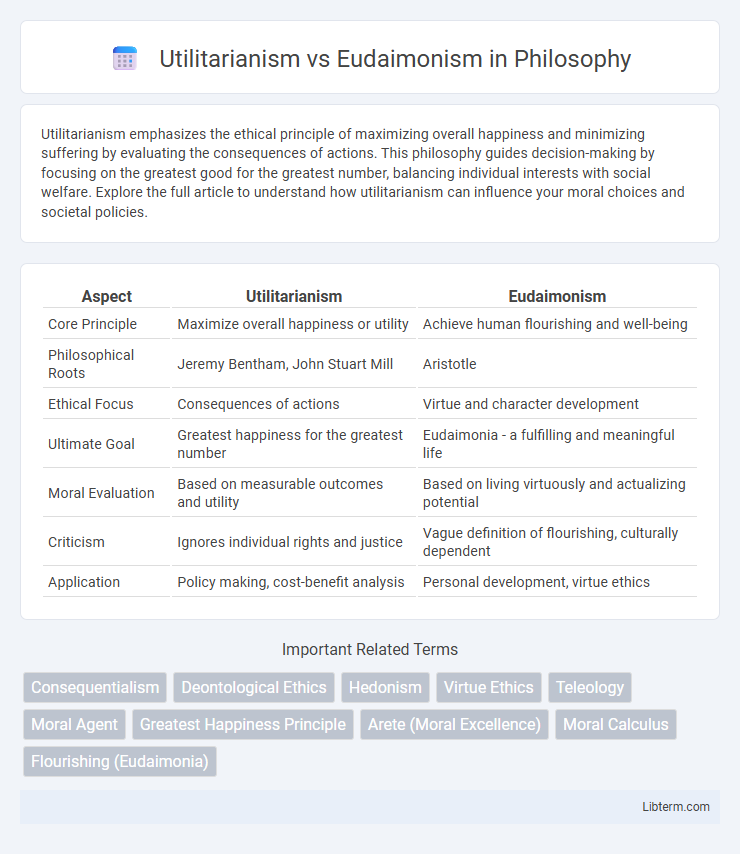Utilitarianism emphasizes the ethical principle of maximizing overall happiness and minimizing suffering by evaluating the consequences of actions. This philosophy guides decision-making by focusing on the greatest good for the greatest number, balancing individual interests with social welfare. Explore the full article to understand how utilitarianism can influence your moral choices and societal policies.
Table of Comparison
| Aspect | Utilitarianism | Eudaimonism |
|---|---|---|
| Core Principle | Maximize overall happiness or utility | Achieve human flourishing and well-being |
| Philosophical Roots | Jeremy Bentham, John Stuart Mill | Aristotle |
| Ethical Focus | Consequences of actions | Virtue and character development |
| Ultimate Goal | Greatest happiness for the greatest number | Eudaimonia - a fulfilling and meaningful life |
| Moral Evaluation | Based on measurable outcomes and utility | Based on living virtuously and actualizing potential |
| Criticism | Ignores individual rights and justice | Vague definition of flourishing, culturally dependent |
| Application | Policy making, cost-benefit analysis | Personal development, virtue ethics |
Introduction to Utilitarianism and Eudaimonism
Utilitarianism, founded by Jeremy Bentham and later expanded by John Stuart Mill, emphasizes maximizing overall happiness or pleasure as the ultimate moral goal, measuring actions by their consequences. Eudaimonism, rooted in Aristotelian ethics, centers on achieving eudaimonia, often translated as flourishing or well-being, through cultivating virtues and living a balanced, meaningful life. Both frameworks offer distinct approaches to ethical decision-making, with utilitarianism prioritizing outcomes and eudaimonism focusing on character and personal fulfillment.
Historical Origins and Key Philosophers
Utilitarianism originated in the 18th and 19th centuries with philosophers Jeremy Bentham and John Stuart Mill, who emphasized maximizing overall happiness and minimizing pain as the basis of moral decision-making. Eudaimonism, rooted in ancient Greek philosophy, particularly Aristotle's Nicomachean Ethics, centers on achieving eudaimonia--flourishing or well-being--through virtue and fulfilling one's potential. These foundational perspectives contrast in their focus on the greatest good for the greatest number versus individual fulfillment and moral character.
Core Principles of Utilitarianism
Utilitarianism centers on maximizing overall happiness by evaluating actions based on their consequences, aiming for the greatest good for the greatest number. Core principles include the principle of utility, which measures the moral worth of actions by their ability to produce pleasure or reduce pain. This consequentialist framework contrasts with Eudaimonism, which emphasizes flourishing and virtue as central to ethical living.
Core Concepts of Eudaimonism
Eudaimonism centers on achieving eudaimonia, often translated as human flourishing or well-being, through the cultivation of virtue and living in accordance with reason. Unlike Utilitarianism, which prioritizes maximizing overall happiness or utility, Eudaimonism emphasizes individual character development and fulfilling one's potential. Key concepts include moral virtues such as courage, temperance, and justice, which are essential for attaining a meaningful and fulfilling life.
Moral Reasoning: Consequences vs. Character
Utilitarianism evaluates moral actions based on their consequences, aiming to maximize overall happiness or utility, emphasizing outcomes in ethical decision-making. Eudaimonism, rooted in Aristotelian ethics, focuses on developing virtuous character traits that lead to human flourishing and well-being over a lifetime. This contrast highlights utilitarianism's emphasis on results with quantifiable benefits versus eudaimonism's cultivation of moral character as the foundation for ethical behavior.
Happiness Defined: Pleasure vs. Flourishing
Utilitarianism defines happiness primarily as the maximization of pleasure and the minimization of pain, emphasizing outcomes that produce the greatest net happiness for the greatest number. Eudaimonism, rooted in Aristotelian philosophy, views happiness as flourishing through the cultivation of virtues and living in accordance with one's true nature, promoting long-term well-being rather than momentary satisfaction. The contrast highlights utilitarianism's focus on hedonistic pleasure versus eudaimonism's emphasis on holistic human development and fulfillment.
Critiques and Limitations of Utilitarianism
Utilitarianism faces critiques for its reliance on quantifying happiness, often neglecting individual rights and justice in pursuit of the greatest good for the greatest number. Critics argue that this approach can justify morally questionable actions if they maximize overall utility, ignoring the intrinsic value of certain ethical principles. Its limitation lies in the difficulty of accurately measuring and comparing diverse human experiences and the potential for minority suffering under majority rule.
Critiques and Limitations of Eudaimonism
Eudaimonism faces critiques for its reliance on subjective interpretations of flourishing, making it difficult to apply universally across diverse cultures and individual circumstances. Critics argue that its focus on long-term well-being may overlook immediate moral obligations or rights, potentially enabling negligence in urgent situations. Furthermore, the ambiguity surrounding what constitutes eudaimonia can lead to conflicting ethical decisions, limiting its practical effectiveness compared to more rule-based theories like utilitarianism.
Practical Implications in Modern Ethics
Utilitarianism emphasizes maximizing overall happiness through cost-benefit analyses, driving policies that prioritize the greatest good for the greatest number. Eudaimonism, rooted in Aristotelian philosophy, focuses on fostering individual flourishing and virtues, influencing contemporary debates on well-being and character development. Modern ethics incorporates both frameworks to balance collective welfare with personal fulfillment in areas such as healthcare, environmental responsibility, and social justice.
Comparative Analysis and Conclusion
Utilitarianism evaluates morality based on the greatest happiness principle, emphasizing outcomes that maximize overall pleasure or utility. Eudaimonism centers on achieving human flourishing through virtue and fulfilling one's potential, prioritizing intrinsic well-being over mere pleasure. Comparative analysis reveals that utilitarianism's focus on consequences contrasts with eudaimonism's emphasis on character development, suggesting that combining both approaches can provide a more holistic ethical framework.
Utilitarianism Infographic

 libterm.com
libterm.com